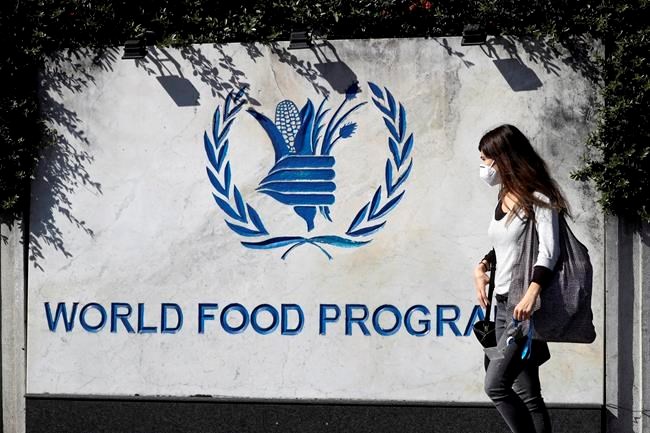OTTAWA — The United Nations World Food Program is thanking Canada for its support after the organization won the Nobel Peace Prize, saying that support is essential with hunger rising due to COVID-19.
Spokeswoman Julie Marshall says Canada is the UN organization’s seventh-largest donor, contributing more than $250 million in 2019, and has supported its work for 50 years.
Because the WFP is fully reliant on voluntary donations, she says the contributions are essential to feeding the rising number of hungry people in the world.
Marshall says the COVID-19 pandemic has made that job harder because the WFP now estimates it will have to feed 138 million people, up from the 100 million it had previously estimated.
The WFP is predicting a funding shortfall of $6.4 billion for 2020.
The Norwegian Nobel Committee awarded the peace prize to WFP for its work in helping feed hundreds of millions of starving people in conflict zones around the world in the midst of the pandemic.
"This prize is for everybody. But Canadians can be very proud to share in this recognition of this great award," Marshall said in an interview.
Marshall said conflict, climate disaster and economic turmoil are the main drivers of hunger.
"But then we have COVID-19. And because of COVID-19, it's making the hungriest hungrier and the poor poorer," she said.
Marshall says that will lead to the "biggest and largest response of WFP’s history. And that means we have some really big funding challenges."
The Nobel commission said in its statement that it was recognizing the WFP "for its efforts to combat hunger, for its contribution to bettering conditions for peace in conflict-affected areas and for acting as a driving force in efforts to prevent the use of hunger as a weapon of war and conflict."
David Beasley, the organization’s executive director, said in a statement that the award for his organization is a reminder of the suffering of the people it tries to help.
"Today, the Norwegian Nobel Committee has turned the global spotlight on them and on the devastating consequences of conflict."
This report by The Canadian Press was first published Oct. 9, 2020.
Mike Blanchfield, The Canadian Press

